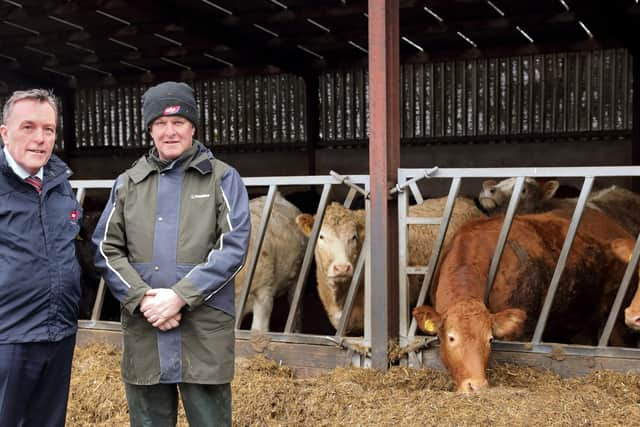Managing carbon efficiently is now the only show in town for beef and sheep farmers
and live on Freeview channel 276
This is the strongly held view of leading livestock producer Sam Chesney, who farms near Kircubbin in Co Down.
“It’s the only show in town,” he stressed.
“And this is a development, which the general public should be made fully aware of.”


Advertisement
Advertisement
According to Chesney, there is now compelling evidence to confirm that beef and sheep farmers can improve efficiency levels in order to drive down the carbon footprint of their businesses.
“But taking this approach also means that they can maintain current production levels,” he further explained.
Recent years have seen Chesney fundamentally alter the focus of his beef and sheep operation.
He has changed the breeding stock on the farm to select for easier fleshing animals while also encouraging the growth of multi-species swards. In addition, he has expanded the footprint of all the hedges on the farm.
Advertisement
Advertisement
Chesney continued:“Responding to climate change will require farmers to reduce greenhouse gas emissions. But full recognition must also be taken of the carbon sequestration levels taking place on our farms.”
The Co Down man also believes that having a verified carbon footprint figure will be a game changer for beef and sheep farmers.
“This will allow livestock producers to take control of the climate change debate. In my own case, the cattle enterprise has a current carbon footprint of 23kg of carbon for every kilo of beef produced,” he explained.
“The equivalent value for the sheep enterprise works out at 17kg of carbon. However, neither of these values takes account of the sequestration taking place on the farm.”
Advertisement
Advertisement
He continued:“We already know the key actions that will drive down the carbon footprint of cattle and sheep enterprises. These include the calving of replacement heifers at 24 months and driving down the slaughter age of stock. But we need more data.”
Turn to page 11
Meanwhile, ABP has announced an investment of £1.5 million in a unique sustainability programme which will support 350 of its farmer suppliers and share wider learnings across the UK beef and sheep sectors.
The new programme, called PRISM 2030, will provide farmers with a support framework initially over 2-3 years. The aim of the programme is to help participants to improve their carbon footprint and sustainability across the entirety of the farm. The detailed programme will include assessment of carbon footprint, soil health, water use and support biodiversity creation and resource efficiency.
Support from Harper Adams University and The Andersons Centre will ensure that farmers have direct and ongoing access to, and feedback from, the very latest environmental innovations and methodologies. A sustainability grant will also be available, alongside peer-to-peer learning and expert advice throughout.
Advertisement
Advertisement
Commenting, Dean Holroyd, Group Technical and Sustainability Director for ABP, said: “British red meat production is amongst the most sustainable in the world, but we can and must do more because as an industry, we are well placed to be part of the climate solution.”
“So we want to build on this position of strength, and while PRISM will mean direct support for those in our supply base who qualify for the programme, all of the outcomes will be made available to the wider industry.
“In this way, it’s our hope that this initiative will play a part in helping beef and sheep farmers across the country become the global leaders in sustainable meat production – with lower emissions, lower costs and improved productivity.”
Sam Chesney is one of the farmers from Northern Ireland involved with the project.
Advertisement
Advertisement
“We have a duty as farmers to help dispel some of the myths about how beef is produced here in the UK. Farmers are a major part of the solution, as potential carbon mitigators, and the PRISM process will enable us to demonstrate and measure that potential,” he said.
“One we are already engaging in carbon audits and although the results are very good, they don’t currently take in to account our grasslands or hedges.
“We hope through this process we can demonstrate that with all measurements considered we are well on our way to being a net zero operation.”
Co. Down sheep farmer Crosby Cleland is also participating in the programme.
Advertisement
Advertisement
He said:“I’ve found throughout my farming career that to be able to compare with others gives me a drive to make positive changes that will help both financially and in regards to climate.
“Gathering data is extremely important and is a key component of the PRISM project - we all need to know where we are performing well and badly, so we can identify improvements that can be made and drive the industry forward.
“Only then can we turn the target on farming’s back and send a clear message why exactly UK farming is ahead of the world when it comes to animal welfare, quality assurance and climate mitigation.
“We are constantly progressing, and this work will capture some of these efforts.”
Advertisement
Advertisement
The collaboration with Andersons is led by partner and Senior Research Consultant Michael Haverty, who, with his team, will focus on carbon assessments as well as other sustainability benchmarking.
Professor Jude Capper leads the input from Harper Adams, and will be indicating what areas each producer could be focusing on over the duration of the project to achieve most gains.